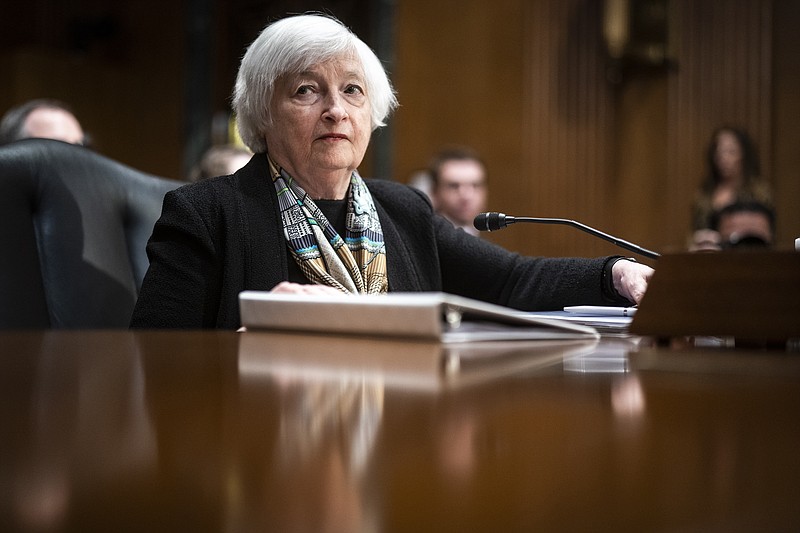The United States will prioritize the protection of national security in its economic relationship with China, according to Treasury Secretary Janet L. Yellen.
In a Washington speech, Yellen said that Biden administration policies are not aimed at slowing China's economic growth -- only limiting its ability to threaten the U.S. militarily.
Yellen's comments, billed as the most comprehensive account of the administration's approach to relations with the world's second-largest economy, made official what has been clear for some time: An era of enthusiastic engagement with China, predicated on mutually beneficial commerce, is all but over.
Her appearance at Johns Hopkins University's School of Advanced International Studies came as the administration is finalizing new restrictions on U.S. investment in Chinese technology ventures. In October, the Commerce Department barred exports to China of the most advanced semiconductors and the equipment used to make them, which have commercial as well as military applications.
"Even as our targeted actions may have economic impacts, they are motivated solely by our concerns about our security and values. Our goal is not to use these tools to gain competitive economic advantage," Yellen said, adding that the United States seeks a "constructive and fair economic relationship with China."
Yellen spoke with U.S.-China relations at their lowest point since then-President Richard M. Nixon's historic 1971 opening to Beijing. Both nations are emphasizing greater economic self-sufficiency, and there are mounting concerns in Washington over Chinese President Xi Jinping's strategic intentions.
On Capitol Hill, sentiment toward China is almost uniformly negative.
The Biden administration has encouraged the relocation of some manufacturing supply chains from China to U.S. allies. But Yellen insisted that Washington wants to avoid an open rupture with Beijing and said she believes the two countries can prosper in tandem.
"We do not seek to 'decouple' our economy from China's. A full separation of our economies would be disastrous for both countries. It would be destabilizing for the rest of the world," she said.
Once-routine communications between American and Chinese diplomats have dwindled under the Biden administration, raising the risk of a costly misunderstanding.
At November's Group of 20 summit in Bali, President Biden agreed with Xi to resume high-level talks between the two nations. But Secretary of State Antony Blinken canceled plans to visit Beijing after a suspected Chinese spy balloon appeared over the United States in February.
Chinese officials initially apologized for what they called a rogue weather balloon, but later bristled and accused Washington of overreacting when U.S. warplanes shot down the craft off the coast of South Carolina.
Chinese officials blame the United States for the erosion in ties and have rebuffed efforts to reschedule Blinken's visit or to set a date for Yellen to meet her counterpart in Beijing.
The treasury secretary also disputed a widespread Chinese view that the United States is a declining power, politically divided and erratic on the world stage.
Despite such sentiments, which she acknowledged some Americans share, the U.S. economy posted the strongest recovery from the covid recession and boasts an unemployment rate near its all-time low. The average American's income is more than five times that of the typical Chinese person, she said. And U.S. democracy, while imperfect, protects the rule of law and free speech.
"It's important to know this: Pronouncements of U.S. decline have been around for decades. But they have always been proven wrong," Yellen said. "The United States has repeatedly demonstrated its ability to adapt and reinvent to face new challenges. This time will be no different -- and the economic statistics show why."
Yellen also called for the two nations to work together on shared problems, such as climate change and debt distress in the developing world.
Such collaboration, she said, should occur "not as a favor to us, but out of our joint duty and obligation to the world."
Yellen said China in recent years has abandoned market-oriented reforms in favor of a state-centric economic model. And she reiterated years of American complaints about Chinese trade policies, saying that China used subsidies and other preferential policies to give its companies an unfair edge over foreign firms.
"This strategy has been coupled with aggressive efforts to acquire new technological know-how and intellectual property -- including through IP theft and other illicit means," she said.
Yellen urged China to accept healthy competition between the two nations.
For decades, even as some analysts warned the United States and China were fated to clash, they built a strong economic relationship. Two-way merchandise trade, despite escalating security fears, approached $700 billion last year.
But American companies have grown increasingly worried about the political risks associated with relying on China as an export base. Xi for months has promoted a "dual circulation" economic strategy aimed at reducing China's dependence upon foreign suppliers while increasing the rest of the world's need for Chinese goods.

